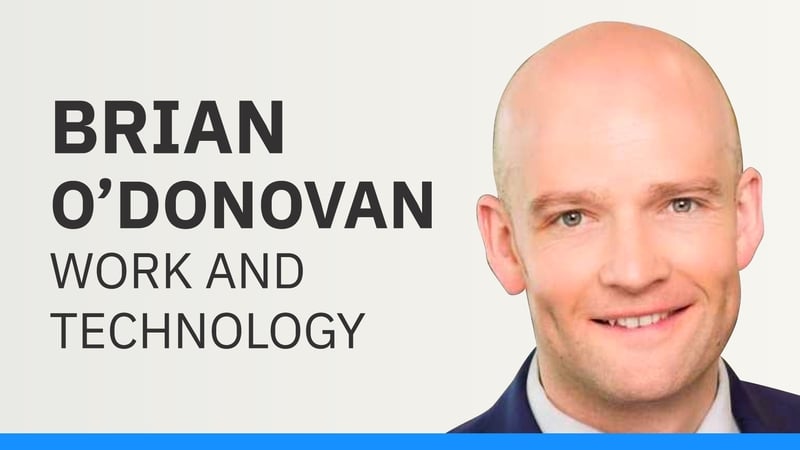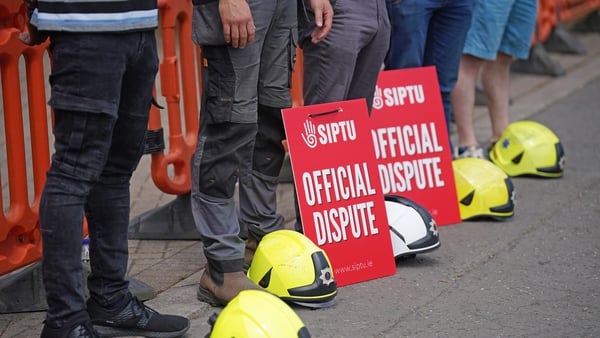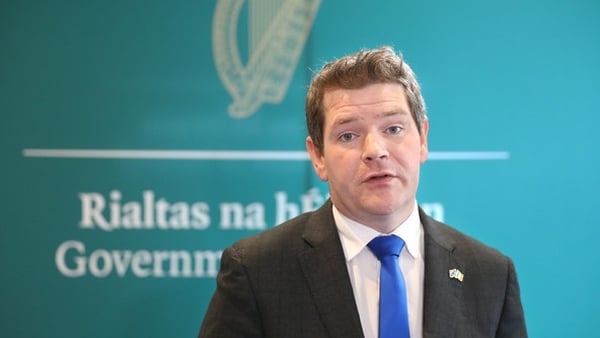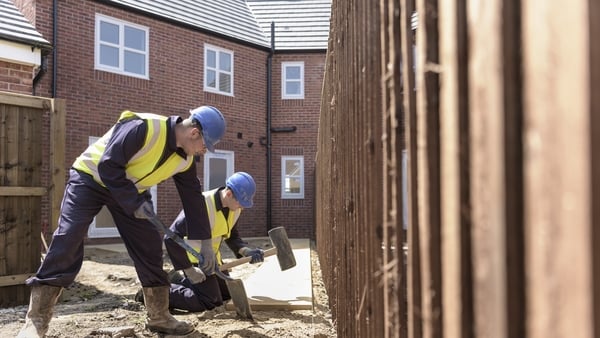The sun glistened on the windows of Lansdowne House, the nine-storey office block in Dublin 4 that houses the Workplace Relations Commission.
It was Wednesday 1 June, technically the first day of Summer. It was also the first day of public sector pay talks between unions and the government.
The start of the new season had brought sunshine and a welcome rise in temperatures and it followed a Spring that had been filled with union conferences.
Across the country, delegates representing a variety of professions had gathered in hotels and convention centres.
They passed motions calling for pay increases. Some demanded double-digit rises, others suggested strike action but all agreed that they were feeling the pressures of inflation.
And so, tasked with negotiating improvements to the public sector pay deal, union leaders arrived at the sun-bathed Workplace Relations Commission.
"We're here to protect the living standards of our members," Kevin Callinan, the President of the Irish Congress of Trade Unions told me.
In March, he and his fellow union leaders triggered a review clause in the current public sector pay deal due to rising inflation.
"Since we triggered this review three months ago things have got a lot worse," Mr Callinan said.
"We're here to see what the government are prepared to do to revise the terms of the current agreement.
"Nobody could have expected that we'd be in this situation 18 months ago and we need a fair deal for public servants."
I asked him what percentage pay increase he would be looking for.
"7% or 8% to match inflation?" I enquired hopefully, knowing full well I would not get an exact figure.
He did however give an insight into what the ballpark number might be.
"The gap between the terms that were agreed 18 months ago and the inflation figures that have emerged both over last year and this year is a significant gap and that gap is where our focus will be," the ICTU president said.
Building Momentum
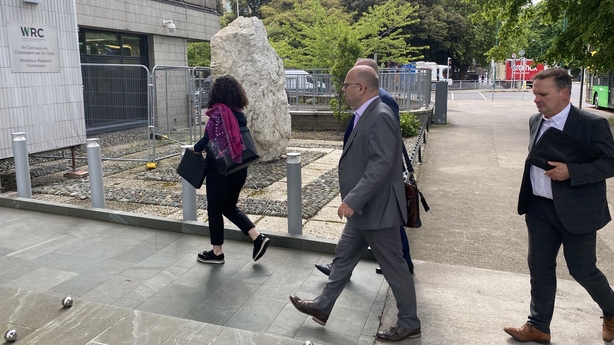
Under the current public sector pay agreement, 'Building Momentum', workers received a 1% pay increase last year, with a further 1% due in October.
At the time, inflation was forecast to be 2% but now it is running closer to 8%.
So, will that 6% gap translate into the percentage pay increase that will be requested by unions?
We don't know the answer to that yet but we do have a better idea of what ICTU would like in terms of an overall deal.
Mr Callinan said on Wednesday that rather than focusing on a brand-new agreement, they would be talking about changes to the current public sector pay deal with a possible extension.
This chimes with what the Government side has been suggesting.
"These will be difficult and challenging negotiations"
The Minister for Public Expenditure and Reform Michael McGrath has said that he is prepared to go beyond the terms contained with the current agreement and that his preference is for a shorter-term arrangement.
As his officials were meeting with unions on Wednesday, Mr McGrath warned that reaching an agreement would not be easy against a backdrop of an extraordinarily high level of inflation and growing uncertainty about the global economy.
"These will be difficult and challenging negotiations," he said.
"I do hope a deal can be agreed, I think it is in the interests of public servants and of the state generally that we secure industrial peace through a collective agreement but it remains to be seen if it will be possible."
Private sector pay
As the pay talks get underway, public servants are no doubt watching what is going on in the private sector.
In December, the Irish Congress of Trade Unions advised that private sector employees should seek pay rises of between 2.5% and 4.5% during 2022.
In February, those figures were revised upwards, due to rising inflation, with unions advised to seek increases in the range of 2.5% and 5.5%.
Last month, ICTU met again to discuss private sector pay but on that occasion, it did not issue revised guidance.
Instead, affiliate unions from a variety of sectors gave updates on negotiations that are currently under way with individual employers.
Delegates said progress on pay was being achieved through a range of methods such as lump sum payments and bonuses, not just percentage increases.
Since July 2021, Tesco Ireland has been in negotiations with unions and on Monday the retailer announced an overall 10% pay increase for staff that covers 2021, 2022 and 2023.
The company said a 6% pay rise is effective from 1 April 2022, 2.5% of which will be backdated to April 2021.
A further 4% increase will be awarded from 1 April 2023.
"I am pleased to be able to make this announcement for our colleagues at a challenging time for families with rising living costs," said Natasha Adams, CEO of Tesco Ireland.
In February, Bank of Ireland and unions agreed a 7.5% pay increase over two years and last month AIB announced a 10% pay increase over three years.
In general, wages are rising but there are massive variations in the levels of increase across different sectors.
Earnings and Labour Costs
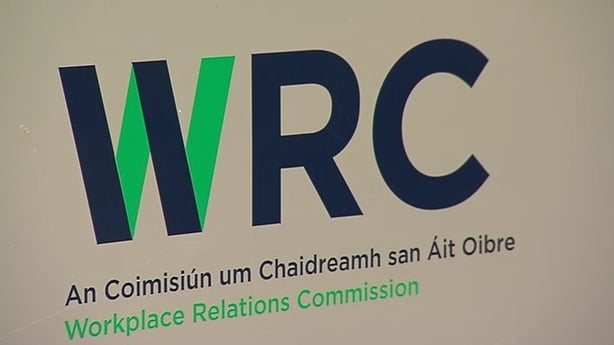
On Tuesday, the latest Earnings and Labour Costs report was released by the Central Statistics Office and showed that average weekly earnings stood at €880.37 in the first quarter of the year, an annual increase of 2.3%.
A separate Labour Market Bulletin from the CSO showed a quarterly increase in weekly earning of 5.9%, with changes by industry ranging from an increase of 22.7% in the financial sector to a decrease of 3.4% in the construction sector.
"Irish workers are pessimistic when it comes to the impact of inflation on their wages"
A Central Bank survey published this week showed that Irish workers are pessimistic when it comes to the impact of inflation on their wages with a majority believing that the real value of their earnings will fall this year.
Just under a third of respondents expect their earnings to increase slightly and of those, the vast majority don't expect the increases to keep pace with inflation.
Back at the public sector pay talks, the clock is ticking.
If a deal is agreed, it may have to go to a ballot of union members. It may also need to be factored into the government's financial framework ahead of October's budget.
"I think we'll know where we'll stand within a short number of weeks and within the month of June, if at all possible, as we move towards the preparation of the Summer Economic Statement which clarifies the budgetary stance and the amount of money we have available," Minister McGrath said.
That means a pay deal would need to be in place by the autumn to avoid a winter of discontent.
The summer talks will resume at the Workplace Relations Commission on Friday.
The forecast is for rain but when it comes to the meeting itself, public service unions will be hoping for a brighter outlook.
